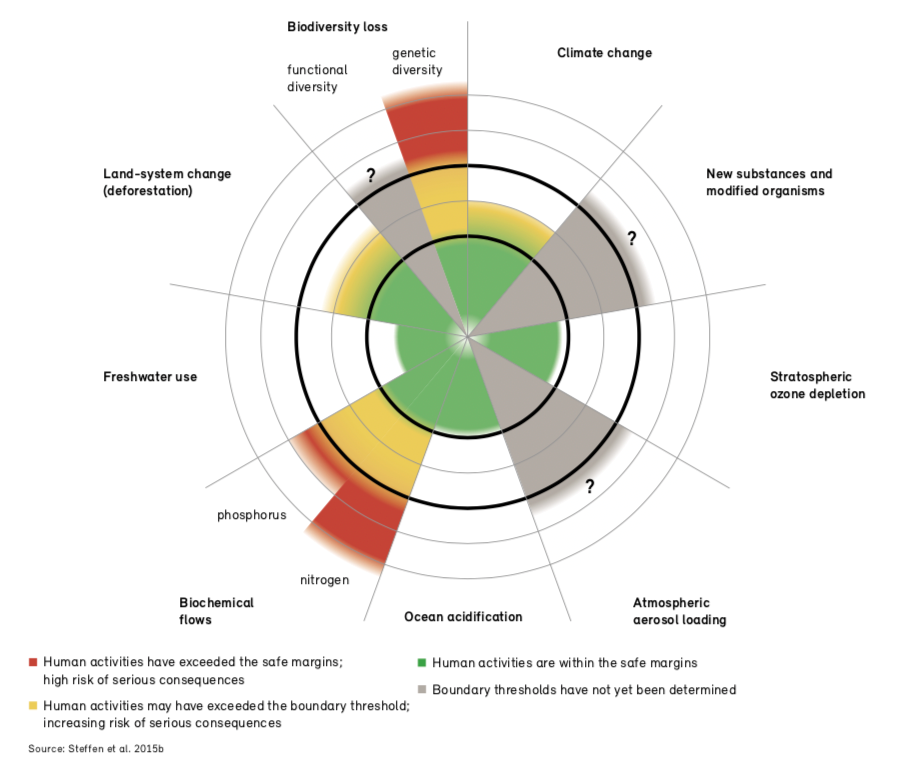Switzerland is overstepping the planet’s boundaries
An analysis of how far we are pushing the boundaries of the planet's resources – and Switzerland's contribution to it – is sobering.
Greta Thunberg, the 16-year-old Swedish climate activist, made headlines with a transatlantic trip on a carbon-neutral sailboat and a fiery opening speech at this week’s United Nations Climate Action Summit. With so much media attention on climate change, we risk forgetting that it’s just the tip of the iceberg. Our planet provides a hospitable living environment through a complex network of interacting systems, and scientists have identified nine different planetary boundaries marking the “safe space” within which humanity can continue to prosper.
These boundaries are not targets that should be reached, like the UN summit’s goal to achieve a 45% reduction in greenhouse gas emissions over the next decade and reach net zero emissions by 2050. Rather, they are frontiers – or “planetary boundaries” – from which we should try to remain at a safe distance (like you would avoid standing on a cliff’s edge).
These planetary boundaries have been adopted by Switzerland’s Federal Office for the Environment to evaluate the country’s environmental policy and performance. A team from the University in Geneva calculated national thresholds for five planetary boundaries: climate change, ocean acidification, land system change, biodiversity loss and the biochemical flows (nitrogen and phosphorus losses). The inner circle of the below graphic represents the safe border. Crossing this (going from green to yellow) means entering a danger zone with an increasing risk for serious consequences.

The results from their analysis provide sobering reading. Despite our clean lakes and rivers, pure mountain air, green meadows and nationwide disciplined recycling, Switzerland has a very large environmental footprint. Per capita, we make a disproportionate contribution to climate change, ocean acidification, biodiversity loss and nitrogen loss.
Through our high living standard and related consumption, with many goods imported from abroad, Switzerland puts high pressure on the planet. In other words, if we adhere to the “equal share per capita” principle (that every person in the world has the same rights) then we are currently using much more than our fair share of global resources. Swiss greenhouse gas emissions are an alarming 22 times above our per capita limit.

We probably do not fully realise how this impacts our future health and well-being. Increasingly frequent summers with several heatwaves will put especially the elderly and the sick at an increased health risk. Ever-decreasing variety in plants and species, traditionally the source of most of our modern medicine, will greatly impact discovery of new treatments. For all of us who enjoy seafood, the increasing acidity of the ocean means that most shellfish will be unable to build strong shells and already today oyster hatcheries in different parts of the world are reporting high mortality rates. Even if you would never dream of eating an oyster and prefer a nice piece of fish, these will find it difficult to survive when their food chain is disrupted. As for our pristine lakes, you may have noticed how the shallower ones like the Zugersee now have a green shine, a sign of excessive algae growth which puts at risk the survival of lake fish species.
The risk of causing irreparable damage to our planet is very real and urgent action is needed. Global measures taken during this next decade will determine whether the planet can continue to offer a hospitable environment for future generations. It may be a daunting challenge but it is not impossible. Thirty years ago, the boundary of ozone depletion was in the danger zone with the discovery of a large hole in the ozone layer. Global decisive action at the time such as banning CFCs has resulted in a gradual improvement. However, the longer we wait, the more critical the situation will become requiring ever more drastic measures.
Our politicians have the power to legislate and enforce climate saving measures. The health of our planet is worsening rapidly and it is important we understand the facts and implications. It is also our duty as the electorate to ensure that we provide our politicians with the mandate to act decisively and support bold national measures to keep the planet safe for our children and grandchildren.
The views expressed in this article are solely those of the author, and do not necessarily reflect the views of swissinfo.ch.

In compliance with the JTI standards
More: SWI swissinfo.ch certified by the Journalism Trust Initiative












You can find an overview of ongoing debates with our journalists here . Please join us!
If you want to start a conversation about a topic raised in this article or want to report factual errors, email us at english@swissinfo.ch.